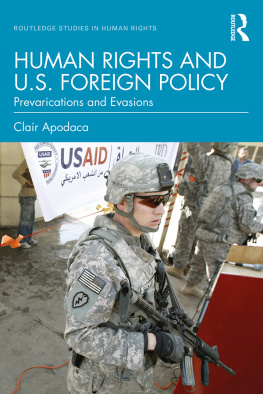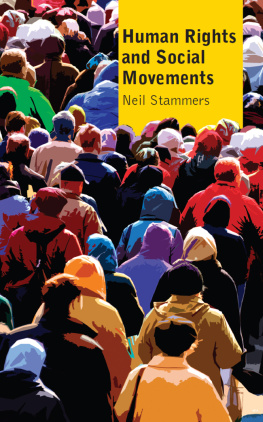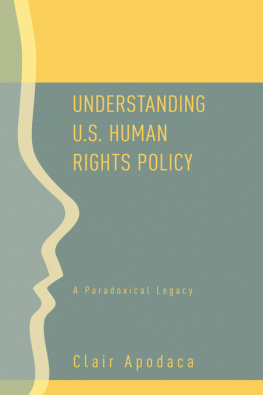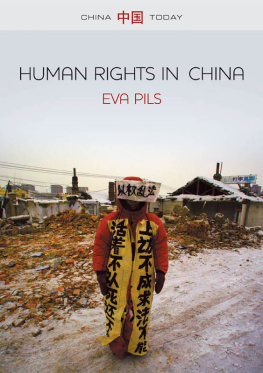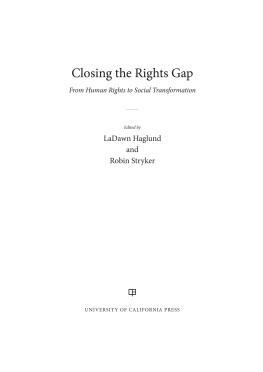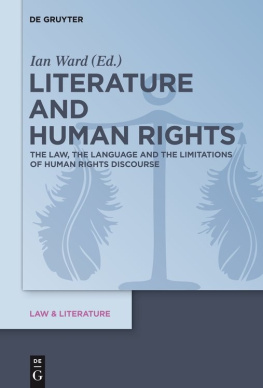Human Rights in Canada

Laurier Studies in Political Philosophy Series
Global migration, MTV, transnational capital, and colonialism have given birth to a new and smaller world. To a greater degree than at any other time in remembered history, different cultures are brought together to live side by side. This close proximity has brought new mixtures and exciting possibilitiesand also new struggles and conflicts. From many quarters comes an urgent call to build a sense of political belonging and unity in a diversity of voices. The call to unity is not, however, for uniformity or hegemony in one particular way of life. The unity to which we refer requires a rethinking and reconceptualization of existing philosophical paradigms that guide our relationships with others. In the spirit of intercultural dialogue, our Laurier Studies in Political Philosophy series is dedicated to exploring key challenges to our changing world and its needs. We are particularly interested in submissions that challenge dominant existing frameworks and approaches. We invite submissions in areas including Multicultural Theory, Aboriginal Studies and Philosophy, Post-colonialism, Globalization, Critical Race Theory, Feminism, and Human Rights Philosophy.
Editorial Committee:
James Tully, Political Science, University of Victoria
Rhoda E. Howard-Hassmann, Canada Research Chair in International Human Rights, Wilfrid Laurier University
Frank Cunningham, Philosophy, University of Toronto
Lynda Lange, Philosophy, University of Toronto
Audra Simpson, Anthropology, Columbia University
Sonia Sikka, Philosophy, Ottawa
Bidyut Chakrabarty, Political Science, University of Delhi
Allison Weir, Philosophy, Wilfrid Laurier University
Chandrakala Padia, Political Science, and Director of Womens Studies, Banaras Hindu University
Dale Turner, Native American Studies, Dartmouth
Michael Murphy, Political Science, University of Northern British Columbia
Kimberly Rygiel, Political Science, Wilfrid Laurier University
Ashwani K. Peetush, Series Editor, Philosophy, Wilfrid Laurier University
For more information, please contact the Series Editors:
|
|---|
Ashwani K. Peetush | Lisa Quinn |
Associate Professor of Philosophy | Associate Director |
Wilfrid Laurier University | Wilfrid Laurier University Press |
75 University Avenue West | 75 University Avenue West |
Waterloo, ON N2L 3C5 | Waterloo, ON N2L 3C5 |
Phone: (519) 884-0710 ext. 3874 | Phone: (519) 884-0710 ext. 2034 |
Fax: (519) 883-0991 | Fax: (519) 725-1399 |
Email: | Email: |
DOMINIQUE CLMENT
Human Rights in Canada
A History
Wilfrid Laurier University Press acknowledges the financial support of the Government of Canada through the Canada Book Fund for our publishing activities. This work was supported by the Research Support Fund.

Library and Archives Canada Cataloguing in Publication
Clment, Dominique, 1975, author
Human rights in Canada : a history / Dominique Clment.
(Laurier studies in political philosophy)
Includes bibliographical references and index.
Issued in print and electronic formats.
ISBN 978-1-77112-163-7 (paperback).ISBN 978-1-77112-165-1 (epub). ISBN 978-1-77112-164-4 (pdf)
1. Human rightsCanadaHistory. 2. Human rightsSocial aspectsCanada. I. Title. II. Series: Laurier studies in political philosophy series
JC599.C3C542 2015 323.0971 C2015-905237-8
C2015-905238-6
Front-cover image: Shutterstock image 80134582. Cover design by David Drummond. Text design by Angela Booth Malleau.
2016 Wilfrid Laurier University Press
Waterloo, Ontario, Canada
www.wlupress.wlu.ca
This book is printed on FSC certified paper and is certified Ecologo. It contains post-consumer fibre, is processed chlorine free, and is manufactured using biogas energy.
Printed in Canada
Every reasonable effort has been made to acquire permission for copyright material used in this text, and to acknowledge all such indebtedness accurately. Any errors and omissions called to the publishers attention will be corrected in future printings.
No part of this publication may be reproduced, stored in a retrieval system, or transmitted, in any form or by any means, without the prior written consent of the publisher or a licence from the Canadian Copyright Licensing Agency (Access Copyright). For an Access Copyright licence, visit http://www.accesscopyright.ca or call toll free to 1-800-893-5777.
Dedicated to Jill
Contents
CHAPTER 1
Liberty and State Formation
CHAPTER 2
Civil Liberties in Canada
CHAPTER 3
Human Rights Beginnings
CHAPTER 4
The Rights Revolution
CHAPTER 5
Contesting Human Rights
Additional Resources
Canadas Human Rights History
www.HistoryOfRights.ca
Canadas Human Rights History is a site dedicated to exploring every aspect of Canadas rights revolution. It is a research and teaching portal for the study of social movements, state policy, and law. In addition to providing information on critical human rights moments and controversies throughout Canadian history, the site provides access to an extensive collection of archival materials. It also contains detailed reading lists, links to other resources, and information on conferences, publications, research funding, and recent events. Unlike most historical websites, this site is not static but, rather, new content is added as the authors scholarship evolves.
Acknowledgements
THIS BOOK IS THE PRODUCT of almost twenty years of study. It began with an honours thesis in 1997 on the Gouzenko Affair. Since then, my passion has been the study of human rights history in Canada. The writing of this book was ultimately precipitated by two fortuitous opportunities in 2012. In that year I was hired to consult for the Canadian Human Rights Commission. The commission wanted a brief history of the (to use their word) evolution of human rights in Canada. For many years now, human rights commissions have been struggling to fulfill their mandate. Not only are they facing extensive cuts to their budgets while the number of complaints is growing, but they are facing a much more diverse array of complaints than was originally envisioned when the legislation was written. I was asked to facilitate a discussion around the origins and evolution of human rights law to help plan a more viable future. It was a welcome opportunity to engage professionals outside academe. That experience inspired me to write this book. I want to thank the commission and its staff for their comments and ideas, some of which have become an important part of this book.
In that same year, I was invited to be a member of the Canadian Museum for Human Rights National Advisory Council. It is telling that the first national museum built in over a generation, and the first one outside Ottawa, is committed to human rights. In the two years preceding the inaugural opening in 2014, I was privileged to participate in regular meetings where we discussed and debated content for the museum. These encounters were some of the most exciting of my career. They were an opportunity to engage with many of the leading human rights practitioners in Canada. It was a wonderful opportunity to contribute to the creation of a national institution. It was also during these meetings that I developed the central arguments in this book.
Next page


